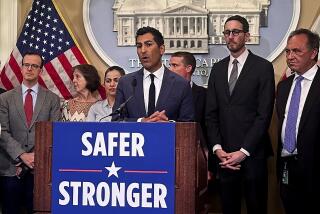House Approves Tough Business Reform Measure
WASHINGTON — Continuing Capitol Hill’s headlong rush to curb corporate corruption, the Republican-controlled House on Tuesday overwhelmingly approved stiff new criminal penalties for securities fraud and other misconduct by business executives.
The 391-28 vote for the legislation marked an abrupt shift from just a few months ago, when the House passed a corporate reform bill without such penalties. The switch is the latest example of a kind of anti-corporate bidding war that has broken out between the two political parties in response to a new cascade of business scandals.
The House vote also vastly increases the chances that the final version of corporate reform legislation that emerges from House-Senate negotiations will contain new criminal penalties for corporate fraud. Those negotiations are set to begin soon. The Senate voted unanimously Monday for a corporate reform bill that includes stiffer anti-fraud penalties.
Like the Senate bill, the measure passed by the House would make securities fraud a federal crime, strengthen laws against document shredding and require corporate executives to certify the accuracy of financial statements.
“This is a tough bill,” said Rep. F. James Sensenbrenner Jr. (R-Wis.). “It’s going to put people in jail for a long, long time.”
Even as House Democrats joined in backing the bill, they derided the motives of Republicans, saying their GOP colleagues were simply playing catch-up on an issue that is sweeping the political landscape.
“This Republican majority ... is looking for a legislative get-well card, as if they are now converted to protecting the investor,” said Rep. Edward J. Markey (D-Mass.).
President Bush has urged Congress to help restore investors’ shaky confidence in corporate leaders by finishing work before its August recess on broad legislation to crack down on accounting shenanigans and other corporate wrongdoing.
In another sign that the GOP is feeling pressure to move quickly, some House Republicans are urging their leaders to simply accept the Senate bill and dispense with conference negotiations. GOP Reps. Mark Foley of Florida and Mike Rogers of Michigan are circulating a letter among Republicans making that request of House Speaker J. Dennis Hastert (R-Ill.).
A spokesman for Hastert rejected that proposal but said GOP leaders hope to begin House-Senate talks as soon as possible.
The version of the corporate reform bill approved by the House in April included no provisions to stiffen penalties for corporate fraud. But since then, the emergence of new corporate scandals, especially the accounting problems admitted by WorldCom Inc., created political pressure for tougher legislation.
The new House measure would raise to 20 years the maximum prison sentences for wire and mail fraud. The Senate bill calls for a 10-year sentence, which is double the existing penalty.
Under the House bill, the new crime of securities fraud, which prosecutors say will make it easier to press cases against business executives, would carry a maximum jail sentence of 25 years. The Senate bill calls for a 10-year term.
The House bill also would, for the first time, establish criminal penalties for retaliation against a corporate whistle-blower. The Senate bill would let whistle-blowers seek a civil remedy in court.
The House bill came to the floor with little advance notice and was whisked through on fast-track procedures that limited debate and barred any amendments. Democrats responded with complaints that the measure was being ramrodded through without their input.
Rep. Maxine Waters (D-Los Angeles) said to Republicans: “You’re trying to jump on the bandwagon at the last minute when you should have been there a long time ago.”
In bringing the bill to the floor, Sensenbrenner invoked the litany of corporate abuse.
“It appears that for some in corporate America the incentives for fraud and ill-begotten gain outweigh the consequences if caught,” he said. “Well, maybe the potential penalties for these crimes are just not strong enough. Today it is our duty to fix that.”
More to Read
Sign up for Essential California
The most important California stories and recommendations in your inbox every morning.
You may occasionally receive promotional content from the Los Angeles Times.











